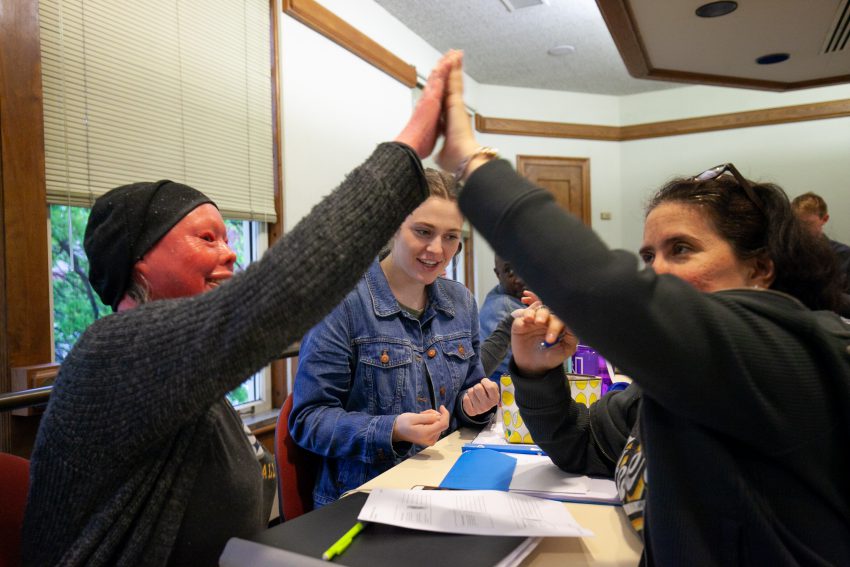As a Bible scholar, multiple stories from Scripture run through my mind when I think of examples of working together. Perhaps the best example of working together begins in Numbers 27. Here, the story of Zelophehad’s daughters not only demonstrates the power of working together but also highlights the importance of having the right people around you to get a job done; of being part of the right squad.
Everyone Needs a Squad
The colloquial designation “squad” was made popular as a term used in hip hop culture to describe a self-chosen group of people with which one wants to identify. Generally, a squad is a group of individuals working together to accomplish a goal, whether a small tactical military unit deployed on a mission, a group of professionals cleaning office buildings at night, or the now-famous group of female members of Congress representing New York, Minnesota, Massachusetts, and Michigan. The story of the daughters of Zelophehad demonstrates the power of working together, the power of a squad.
Found in Numbers 27:1-11 and 36:1-12, the daughters’ two-part story is embedded in a larger narrative familiar to many readers. Readers encounter this story as the Israelites have escaped Egypt and are on their way to Canaan—the land of promise. On the heels of military skirmishes, war, and occupying foreign lands, when readers catch up with Moses, the high priest Eleazar, and the Israelites in Num 27, the people have participated in a census.
Bold and Courageous Women
According to the biblical writer, the daughters of a man named Zelophehad show up to the meeting where—after acquiring land in battle and completing a census—Moses and the elders are dividing the land among the male heads of household. The daughters of Zelophehad approach the gathering. Speaking in unison, they ask for the land that would otherwise be given to their recently-deceased father.
Normally, in a patriarchal society like the one depicted in the Bible, a man bequeathed his property to his sons. This custom was particularly important because in agrarian societies like the one depicted in biblical Israel, land ownership represented rights and privileges. In addition to maintaining control of the major mechanism for economic production and income generated from that production, those who controlled land possessed proprietary rights to the things that were attendant to it (i.e., rents, goods and services, and labor).[1]
The story of Zelophehad’s daughters is counterintuitive because in the biblical text, generally women were prohibited from participating in these spaces. The receipt of their father’s inheritance share (Zelophehad had no sons) ostensibly grants the daughters legal authority associated with property ownership. Indeed, when these women come to claim what they understand to be due them, they are challenging the status quo.[2] Theirs is a bold move.
And the sisters are correct in their boldness! In Num 27:5, Moses brings the sisters’ case before the LORD. And in verses 6-7, readers learn:
“the LORD spoke to Moses, saying: The daughters of Zelophehad are right in what they are saying; you shall indeed let them possess an inheritance among their father’s brothers and pass the inheritance of their father on to them.”
Nevertheless, They Persisted!
In chapter 36 the community elders approach Moses and ostensibly add a stipulation to the Lord’s directive. The daughters of Zelophehad may indeed inherit their father’s portion, but they must marry within their kin group. Seemingly working together, all five of the daughters comply with this new requirement and marry sons of their father’s brothers in verse 36:11. The Zelophehad sisters fulfill the new condition of inheritance, but then Moses dies before the land is transferred to them. Thus, at the end of Num 36, the daughters are without their father and without their land.
But that is not the end of the story for the Zelophehad squad. Careful readers of the biblical text find the resolution in Joshua 17. There, nestled in verses 3-4, readers find the following:
“Now Zelophehad son of Hepher son of Gilead son of Machir son of Manasseh had no sons, but only daughters; and these are the names of his daughters: Mahlah, Noah, Hoglah, Milcah, and Tirzah. They came before the priest Eleazar and Joshua son of Nun and the leaders, and said, ‘The LORD commanded Moses to give us an inheritance along with our male kin.’ So according to the commandment of the LORD he [Joshua] gave them an inheritance among the kinsmen of their father.”
Working as a Squad
Working together, the squad approached the authorities, spoke in unison, and received the promise of inheritance made in Numbers 27. The squad reassembled, complied with the new marriage stipulation as a unit, and approached the new community leader prepared to receive their promised inheritance. Together, the squad lived through the death of Moses. Together, all five watched Joshua lead the Israelites triumphantly at Jericho. As a team, all five lived through the northern and southern expansions. And as a squad, all five daughters of Zelophehad show up in Joshua 17. There they finally receive from Joshua what was the promised to them in the book of Numbers. Despite the many obstacles, the squad met its goal. The daughters of Zelophehad receive their inheritance.
Get Yourself a Squad!
I encourage you to get yourself a squad that will stick with you—even through your Numbers 36 obstacles. Imagine how powerful we would be if, like Mahlah, Noah, Hoglah, Milcah, and Tirzah, we worked together. Get yourself a squad!
Get yourself a squad like the iconic Radio City Rockettes. You need talented and versatile people on your squad. You need a squad that will dance with you and will catch you will you fall. Trust and cherish your squad!
Get yourself a squad like the one Steve Rogers (aka, Marvel’s Captain America) had when he thought he was battling Thanos by himself in Avengers: Endgame. Moviegoers might remember the dramatic scene in which Captain America, standing exhausted and alone among the ruins of battle, suddenly hears a barely audible voice. “On your left.” He slowly turns over his shoulder and sees King T’Challa/The Black Panther and the Wakandan army there to support him. One by one, the other members of the Avengers squad arrive to work together and help Captain America defeat Thanos.
Get yourself a squad that will surprise you with their commitment. A squad that will unify and support you when your challenge seems insurmountable. A squad that will stick with you through uncertain circumstances. Get yourself a squad that will show up when you need them most. Work together! Assemble your squad!
 The Rev. Dr. Kimberly D. Russaw is associate professor of Old Testament at Pittsburgh Theological Seminary.
The Rev. Dr. Kimberly D. Russaw is associate professor of Old Testament at Pittsburgh Theological Seminary.
A version of this essay appeared in the spring 2023 issue of Panorama
[1] Gerhard E. Lenski, Power and Privilege: A Theory of Social Stratification (Chapel Hill: The University of North Carolina Press, 1984), 216, 220, and 229.
[2] Raymond Westbrook points out that the heirs of the first rank who inherited automatically were the deceased’s legitimate sons, namely, sons born of a legitimate marriage. Where a son had already died but had left sons, the grandchildren would take his share alongside their uncle, and divide it between themselves. See Raymond Westbrook, The Character of Ancient Near Eastern Law (Leiden, The Netherlands: Brill, 2003), 57. For more on daughter inheritance see Zafrira Ben-Barak, Inheritance by Daughters in Israel and the Ancient Near East: A Social, Legal, and Ideological Revolution (Jaffa, Israel: Archaeological Center Publications, 2006).

